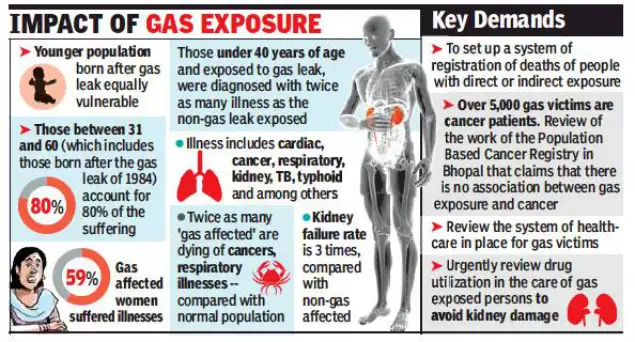Madhya Pradesh
40 Years of Bhopal Gas Tragedy
- 02 Dec 2024
- 3 min read
Why in News?
Four decades after the Bhopal gas tragedy, government authorities have failed to safely dispose of hundreds of tonnes of toxic waste still present on the premises of Union Carbide India Limited (UCIL), despite multiple court orders and warnings.
Key Points
- Historical Context and Disposal Challenges:
- The Bhopal gas tragedy was one of the worst industrial accidents in history that occurred on the night of 2-3 December 1984 at the Union Carbide India Limited (UCIL) pesticide plant in Bhopal, MP.
- It exposed people and animals to the highly toxic gas methyl isocyanate (MIC), causing immediate and long-term health effects and deaths.
- Toxic waste generated during pesticide production between 1969 and 1984 was dumped on-site, with hazardous practices and regulatory negligence worsening contamination.
- In 2005, the Madhya Pradesh Pollution Control Board collected waste, with a portion incinerated and 337 MT stored in a shed.
- In 2015, the Central Pollution Control Board incinerated 10 MT on a trial basis and recommended further disposal, which has not occurred.
- The Bhopal gas tragedy was one of the worst industrial accidents in history that occurred on the night of 2-3 December 1984 at the Union Carbide India Limited (UCIL) pesticide plant in Bhopal, MP.
- Government Funding and Toxic Waste Disposal:
- The Union government released Rs 126 crore to the Madhya Pradesh government for disposing of 337 MT of toxic waste stored on the Union Carbide premises since 2005.
- A 2010 study revealed the site also contains 11 lakh tonnes of contaminated soil, one tonne of mercury, and nearly 150 tonnes of underground dumps, with no disposal plans for this waste yet.
- The report noted that the 2005 collection of waste was incomplete, recommending excavation of buried toxic waste for remediation.
- The disposal of the 337 MT of waste has yet to begin due to administrative hurdles.
- Groundwater Contamination:
- Studies have found groundwater in residential areas near the factory contaminated with heavy metals and toxic substances, raising cancer and health risks. Experts warn of further contamination during rainy seasons.
- The government has sealed hand pumps and tube wells and expanded the distribution of safe drinking water to 42 localities near the factory. However, residents continue to use contaminated water for non-drinking purposes.
- Despite these measures, groundwater contamination continues to spread, creating new victims 40 years after the gas tragedy.
- Health impacts include severe diseases caused by prolonged exposure to toxic substances.
- Studies have found groundwater in residential areas near the factory contaminated with heavy metals and toxic substances, raising cancer and health risks. Experts warn of further contamination during rainy seasons.
- Judicial and Regulatory Oversight:
- The National Green Tribunal (NGT) criticized the government’s inaction, emphasizing the leachate’s role in contaminating water bodies.
- It ordered waste disposal within six months in March 2022, but the directive remains unimplemented.
- Following complaints of groundwater contamination, the Supreme Court directed the state to enhance access to safe water and address contamination.
- The National Green Tribunal (NGT) criticized the government’s inaction, emphasizing the leachate’s role in contaminating water bodies.





